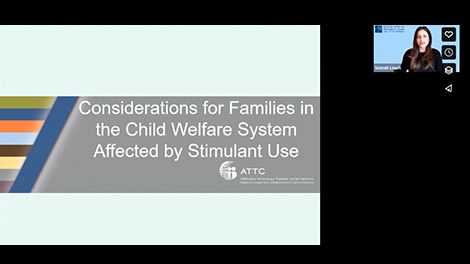Stimulants
Stimulant and methamphetamine use disorders are complex brain diseases that affect an individual’s well-being and can also affect their entire family. Learn more about effective strategies and treatment. Recovery is possible.
Highlighted Resource
Considerations For Families in the Child Welfare System Affected by Stimulant Use

Addiction Technology Transfer Center Network Stimulant Workgroup, Nat..., 2022
This training examines effects of stimulant use on parents and their children. Participants will be able to assess how stimulant use may affect
...(Read More)Policy and Practice Resources
Strategies to Support Parents with Methamphetamine Use Disorder and Their Families
National Center on Substance Abuse and Chil..., 2022
Child welfare staff identify methamphetamine use as a continuing or reemerging
... (Read More)Supporting Children Affected by Parental Methamphetamine Use
National Center on Substance Abuse and Child..., 2021
Parental methamphetamine use increases the risk of child abuse and neglect. This tip
... (Read More)Treatment of Stimulant Disorders
Substance Abuse and Mental Health Services ..., 2020
This guide supports health care providers, systems, and communities seeking to treat
... (Read More)Children Affected by Methamphetamine Program: Implementation Progress and Performance Measurement Report
National Center on Substance Abuse and Child..., 2016
SAMHSA funded the Children Affected by Methamphetamine grant program to improve the
... (Read More)ATTC Network’s National Stimulant Core Curriculum
Addiction Technology Transfer Center (ATTC)...
This training, part of a core curriculum training package, provides information about
... (Read More)Matrix Manuals
Substance Abuse and Mental Health Services ...
These comprehensive resources provide SUD professionals with tools to implement the
... (Read More)Methamphetamine Abuse in Women of Reproductive Age
American College of Obstetricians and Gynec...
The American College of Obstetricians and Gynecologists originally published this
... (Read More)Tips for Teens: The Truth About Stimulants
Substance Abuse and Mental Health Services ...
This fact sheet describes short- and long-term stimulant effects, lists signs of use
... (Read More)Related Online Training, Videos, and Webinars
How Using Contingency Management Can Support Families Affected by Substance Use Disorders
Date: September 29, 2022
Features 1) an overview of contingency management including the implementation with different cultural populations, 2) the
...(Read More)Considerations For Families in the Child Welfare System Affected by Stimulant Use
Addiction Technology Transfer Center Networ..., 2022
This training examines effects of stimulant use on parents and their children
... (Read More)Contingency Management in Health Care Settings
Northwest Addiction Technology Transfer Cent...
This series serves as a bridge to intensive technical assistance for health care
... (Read More)Additional Resources
Meth360 Information Kit
The Partnership at Drugfree.org
This kit provides six fact sheets about methamphetamine that discuss effects of use
... (Read More)Methamphetamine
National Institutes of Health (NIH)
Provides information on methamphetamine and includes a brief overview, street and
... (Read More)